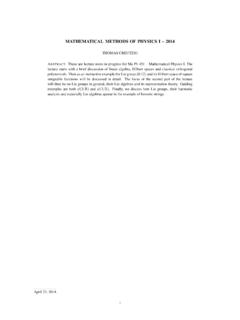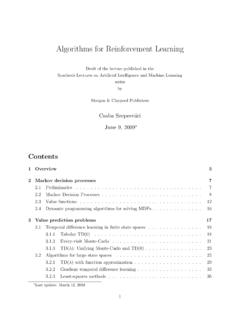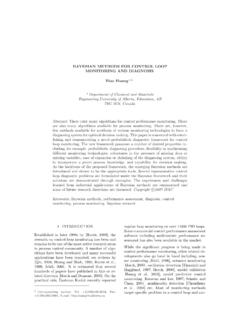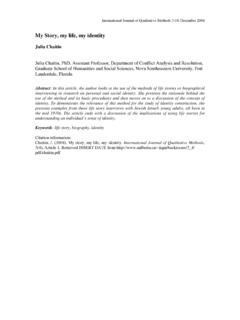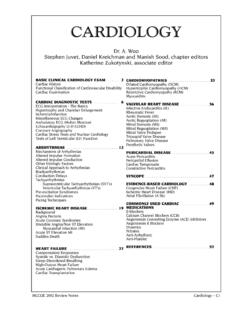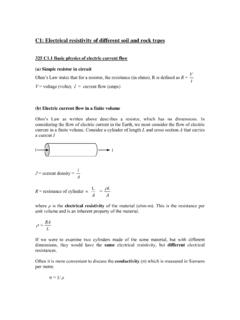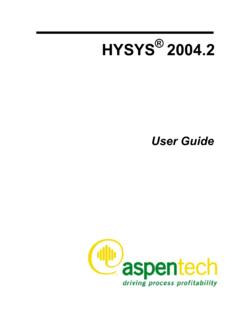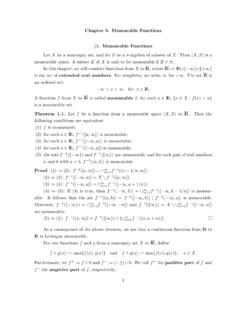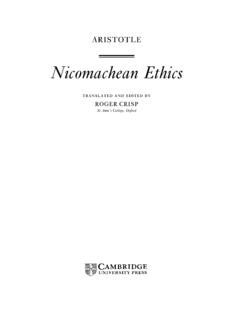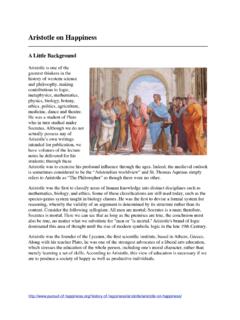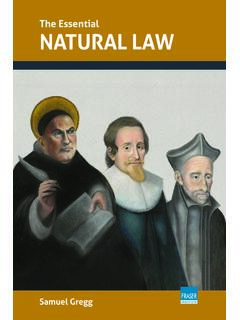Transcription of Citations in Classics and Ancient History
1 Citations in Classics and Ancient History The most common style in use in the field of Classical Studies is the author-date style, also known as Chicago 2, but MLA is also quite common and perfectly acceptable. Quick guides for each of MLA and Chicago 2 are readily available as PDF downloads. The Chicago Manual of Style Online offers a guide on their web-page: The Modern Language Association (MLA) does not, but many educational institutions post an MLA guide for free access. While a specific citation style should be followed carefully, none take into account the specific practices of Classical Studies. They are all (Chicago, MLA and others) perfectly suitable for citing most resources, but should not be followed for citing Ancient Greek and Latin primary source material, including primary sources in translation. Citing Primary Sources: Every Ancient text has its own unique system for locating content by numbers. For example, Homer's Iliad is divided into 24 Books (what we might now call chapters) and the lines of each Book are numbered from line 1.
2 Herodotus' Histories is divided into nine Books and each of these Books is divided into Chapters and each chapter into line numbers. The purpose of such a system is that the Iliad, or any primary source, can be cited in any language and from any publication and always refer to the same passage. That is why we do not cite Herodotus page 66. Page 66 in what publication, in what edition? Very early in your textbook, Apodexis Historia, a passage from Herodotus is reproduced. This particular passage is taken from the Macaulay translation of 1890 and is identified as Herodotus i. 56 - 58 ( is also acceptable). That is; Herodotus, The Histories, 1 Book I (1 is also acceptable), Chapters 56 to 58 (line numbers are not necessary unless specific attention is being drawn to those lines). 1. But we do not give the title of the work if an author has only one extant text. We can simply cite Herodotus because the Histories is the only work we have by that author. Citation in Classics and Ancient History - 2.
3 Using this passage in your essay is even easier than using secondary sources. For example: Herodotus ( ) says that the Athenians were part of the Ionian tribe of Greeks. " the Lacedaemonians and the Athenians had the pre-eminence, the first of the Dorian and the others of the Ionian tribe" (Hdt. ). Herodotus ( ) reminds us that " the Lacedaemonians and the Athenians had the pre- eminence, the first of the Dorian and the others of the Ionian tribe.". It isn't necessary to include the publication from which you took the quote since your audience can refer to any publication and find the same passage. So, if you are citing a passage of Thucydides from Apodexis Historia, you don't need to cite the collection itself, just the Thucydides passage. However, we sometimes compare various translations and, in that case, it is proper to include them in the Bibliography. The translator should be acknowledged in a footnote and the publications are listed as: De S lincourt, Aubrey, trans.
4 1972 (1954). Herodotus, The Histories. London, New York: Penguin Books. Fitzgerald, Robert, trans. 2004 (1974). The Iliad, Homer. New York: Farrar, Straus and Giroux. Lattimore, Richmond, tans. 1951. The Iliad of Homer. Chicago: University of Chicago Press. Shankman, Steven, Ed. 1996. The Iliad of Homer Translated by Alexander Pope. 2 London, New York: Penguin Books. Strassler, Robert B. Ed. 2007. The Landmark Herodotus, the Histories. Andrea L. Purvis trans. New York: Anchor Books. 3. Waterfield, Robin, trans. 1998. Herodotus, The Histories. Oxford University Press. 2. A more complicated scenario: Homer is the author, Alexander Pope the translator, but both have been dead long enough that they have no claim to copyright. The editor of the current edition, Steven Shankman, holds copyright and so the work is listed under his name. 3. Andrea Purvis may hold copyright to the translation, but in this particular publication the editor, Robert Strassler, holds copyright so the work is listed under his name.
5 Citation in Classics and Ancient History - 3. Standard Abbreviations A. Source Abbrev. Works (English/ Latin) Abbrev. Aelian Ael. Historical Miscellany / Varia Historia VH. On the Nature of Animals / De Natura Animalium NA. Aeschines Aeschin. Against Timarchus Aeschin. 1. On the Embassy Aeshcin. 2. Against Cetisiphon Aeshcin. 3. Aeschylus Aesch. Agamemnon Ag. Eumenides Eum. Libation Bearers / Choephoroe Lib. / Cho. Persians / Persae Pers. Prometheus Bound / Prometheus Vinctus PB / PV. Seven Against Thebes Seven / Sept. Suppliant Women / Supplices Supp. Andocides Andoc. On the Mysteries Andoc. 1. On His Return Andoc. 2. On the Peace Andoc. 3. Against Alcibiades Andoc. 4. Antipon Antiph. Against the Stepmother Antiph. 1. First Tetralogy Antiph. 2. Second Tetralogy Antiph. 3. Third Tetralogy Antiph. 4. On the Murder of Herodes Antiph. 5. On the Choreutes Antiph. 6. Apollodorus Apollod. Library / Bibliotheca Bibl. Epitome Epit. Apollonius Ap. Rhod. Argonautica Argon.
6 Citation in Classics and Ancient History - 4. Aristides, Ael. Ar. The Art of Rhetoric / Ars Rhetorica Ars. Aelius Orations (numbered from 1 to 50) Orat. Aristophanes Ar. Acharnians / Acharnenses Ach. Birds / Aves Birds/ Av. Clouds / Nubes Cl. /Nub. Ecclesiazusae Eccl. Frogs / Ranae Frogs Knights / Equites Kn. / Eq. Lysistrata Lys. Peace Peace Plutus Pl. Thesmophoriazusae Thes. Wasps / Vespae Wasps Aristotle Arist. Athenian Constitution / Athenaion Politeia Ath. Pol. Economics / Oeconomica Econ. Eudamian ethics Eud. Eth. Metaphysics Met. Meteorology Mete. nicomachean ethics Nic. Eth. On Generation and Corruption Gen. Corr. On the Generation of Animals Gen. An. On the Heavens / De Caelo Cael. On the History of Animals Hist. An. On the Parts of Animals Part. An. On the Soul / De Anima De An. Physics Ph. Poetics Poet. politics Pol. Problems Pr. Rhetoric Rh. Topics Top. Citation in Classics and Ancient History - 5. Virtues and Vices Arrian Arr. The History of Alexander / Anabasis Alexandri Anab.
7 Indica Ind. Athenaeus Ath. The Diepnosophists B. Bacchylides Bacchyl. Epinicians Ep. Dithyrambs Dith. C. Callimachus Call. Aetia Aet. Epigrams Epig. Hymn to Zeus H. 1. Hymn to Apollo Ap. Hymn to Artemis H. 3. Hymn to Delos H. 4. Hymn to Athena H. 5. Hymn to Demeter H. 6. Ctesias Ctes. Photius' Epitome of the Persica of Ctesius Quintus Curt. History of Alexander Curtius Rufus D. Demades Demad. On the Twelve Years Demosthenes Dem. Letters L. Olynthiac 1 Dem. 1. Olynthiac 2 Dem. 2. Olynthiac 3 Dem. 3. Philippic 1 Dem. 4. On the Peace Dem. 5. Citation in Classics and Ancient History - 6. Philipic 2 Dem. 6. On the Halonnesus Dem. 7. On the Chersonese Dem. 8. Philippic 3 Dem. 9. Philippic 4 Dem. 10. Reply to Philip Dem. 11. Philip Dem. 12. On Organization Dem. 13. On the Navy Dem. 14. On the Freedom of the Rhodians Dem. 15. For the Megalopolitans Dem. 16. On the Accession of Alexander Dem. 17. On the Crown Dem. 18. On the False Embassy Dem. 19. Against Leptines Dem. 20.
8 Against Midias Dem. 21. Against Androtion Dem. 22. Against Arstocrates Dem. 23. Against Timocrates Dem. 24. Against Arstogiton 1 Dem. 25. Against Arstogiton 2 Dem. 26. Against Aphobus 1 Dem. 27. Against Aphobus 2 Dem. 28. Against Aphobus Dem. 29. Against Onetor 1 Dem. 30. Against Onetor 2 Dem. 31. Against Zenothemis Dem. 32. Against Apatourius Dem. 33. Against Phormio Dem. 34. Against Lacritus Dem. 35. For Phormio Dem. 36. Citation in Classics and Ancient History - 7. Against Pantaenetus Dem. 37. Against Nausimachus and Xenopeithes Dem. 38. Against Boeotus 1 Dem. 39. Against Boeotus 2 Dem. 40. Against Spudias Dem. 41. Against Phaenippus Dem. 42. Against Macartatus Dem. 43. Against Leochares Dem. 44. Against Stephanus 1 Dem. 45. Against Stephanus 2 Dem. 46. Against Evergus and Mnesibulus Dem. 47. Against Olympiodorus Dem. 48. Against Timotheus Dem. 49. Against Polycles Dem. 50. On the Trierarchic Crown Dem. 51. Against Callippus Dem. 52. Against Nicostratus Dem. 53.
9 Against Conon Dem. 54. Against Callicles Dem. 55. Against Dionysodorus Dem. 56. Against Eubulides Dem. 57. Against Theocrines Dem. 58. Against Neaera Dem. 59. Funeral Speech Dem. 60. Erotic Essay Dem. 61. Deinarchus Din. Against Demosthenes Din. 1. (Dinarchus) Against Aristogeiton Din. 2. Against Philocles Din. 3. Diodorus Diod. Bibliotheca Historica Siculus Citation in Classics and Ancient History - 8. Diogenes DL Lives of the Eminent Philosophers Laertius Diog. Laert. Dionysius of Dion. Hal. Roman Antiquities Ant. Rom. Halicarnassus The Ancient Orators / De Antiquis Oratoribus Orat. On Lysias Lys. On Isocrates Isoc. On Isaeus Is. On Demosthenes Dem. To Ammaeus (Letters) 1 and 2 Amm. On Dinarchus Din. On Thucydides Thuc. On Literary Composition Comp. To Pompeius Pomp. E. Epicurus Epicurus Epistles Ep. Euripides Eur. Alcestis Alc. Andromache Andr. Bacchae Bacch. Cyclops Cyc. Electra El. Hecuba Hec. Helen Hel. Heraclidae Heraclid. Heracles Her. Hippolytus Hipp. Ion Ion Iphigenia in Aulus IA.
10 Iphigenia in Tauris IT. Medea Med. Orestes Or. Citation in Classics and Ancient History - 9. Phoenissae Phoen. Rhesus Rhes. Suppliants Sup. Trojan Women Tro. H. Herodotus Hdt. The Histories Hesiod Hes. Shield of Heracles Sh. Theogony Theog. Works and Days WD. Hippocrates Hippoc. Airs Waters Places Aer. Aphorisms Aph. Epidemics Epid. The Law / Lex Lex The Oath / Jusjurandum Jusj. On Ancient Medicine On Articulations Art. On Fistulae Fist. On Fractures Fract. On Haemorrhoids Haem. On Injuries to the Head VC. On Regimen in Acute Diseases Acut. On the Sacred Disease / De Morbo Sacro Morb. Sacr. On Surgery On Ulcers Ulc. Prognostics Prog. Homer Hom. Iliad Il. Odyssey Od. Homeric Hymns HH. Hyperides Hyp. In Defence of Lycophron Hyp. 1. Citation in Classics and Ancient History - 10. Against Philippides Hyp. 2. Agaisnt Athenogenes Hyp. 3. Against Demosthenes Hyp. 4. Funeral Oration Hyp. 5. I/J. Josephus Joseph. Jewish Antiquities AJ. The Jewish Wars / Bellum Judaicum BJ.
